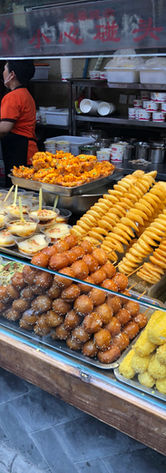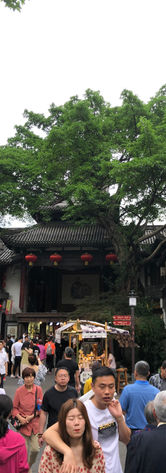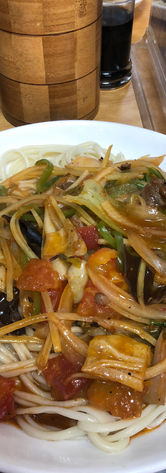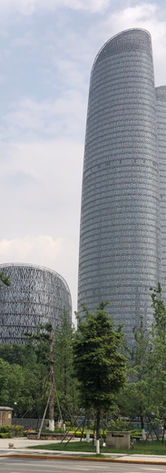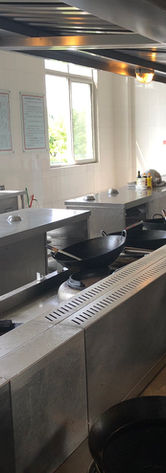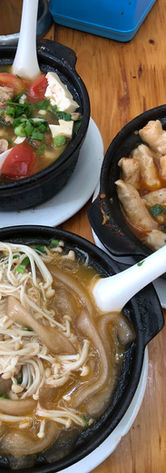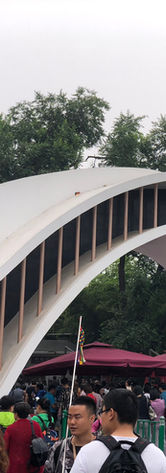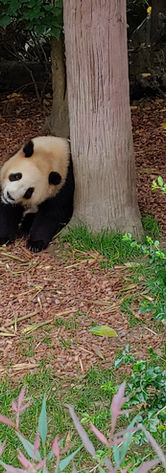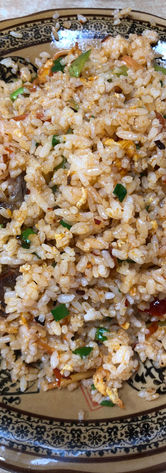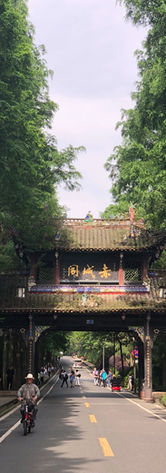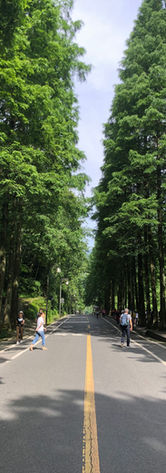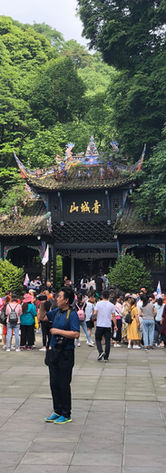
UF IN CHENGDU
"This program was offered in collaboration with the Southwestern University of Finance and Economics’ (SWUFE) College of International Education where students spent Summer A studying Chinese Language in Chengdu, China. Chengdu is an old capital city of China as well as a modern metropolis. In addition to scenic and historic sites within the city, places of interest nearby include the Buddha of Leshan and beautiful Emei Mountain. Program excursions included visits to the Giant Panda Breeding Research Base and Qingcheng Mountain."
Chengdu's Ethos: Creativeness


I found the most fascinating aspect of Chengdu’s ethos to be the creativeness of the cuisine here. The dishes here in Chengdu go beyond just appealing to the taste buds, there is a profound meaning behind each, and every dish prepared. More specifically, I’ve noticed that one’s health is often taken into consideration during the creative process of making the dish. An emphasis is also placed on the making and enjoyment of the dishes in Chengdu.
Chengdu’s geographic location is known for its high humidity and overcast weather, as a result, many dishes found in the region are known to be spicy and numbing. The famous fiery and numbingly delicious dishes found in the Sichuan province is said to counter one’s internal dampness caused by the regional climate. This is also reflective of traditional Chinese medicine philosophy, the concept of finding a balance between oneself and the environment. The dishes in Chengdu and China in general vary with the changing seasons. For instance, during the current summer season, I’ve noticed the popularity of cold noodles on the streets whereas during a cold, rainy day I saw a lot of people eating at restaurants that sold spicy noodle soup. Both examples show the importance of keeping a balance between one’s body and the outside environment, cold noodles on a hot summer day and warm broth on a chilly day.
The cuisine here in Chengdu also offers an array of unique dishes, where no two dish tastes the same. Each dish provides an experience in and of itself, making sure that the person savoring the dish is involved and engaged in the dish too. An example is enjoying the famous hotpot here in Chengdu, an exciting and novel way of sharing a meal with friends. Just thinking back to eating hotpot here brings fond memories of friends trying pig’s brain for the first time because we had difficulty reading the menu. Another great example is having maocai 冒菜 in Chengdu, where the individual is tasked with picking out the ingredients and soup base for their dish. A large emphasis is placed on the individual’s engagement with the dish, making sure to keep them intrigued. I believe this emphasis on engagement is one reason why I love maocai so much, knowing that I was involved in the creation process and that it is specifically customized to my tastes and preferences.
Overall, I was captivated by the creative facet of Chengdu’s ethos because of the care and attentiveness placed behind each dish. The cuisine not only takes traditional Chinese medicine philosophy into consideration but also ensures that the individual creates fond memories when enjoying their dish. While the fiery, mouth-numbing dishes are enticing, I would say the adventure of eating as a whole here in Chengdu is next to none.

Chengdu's Tea Culture: Heming Teahouse at People's Park

Experiencing tea culture for the first time in Chengdu at People’s Park was quite reminiscent of my childhood. My experience there brought back fond memories of when my grandpa would take me to see the Chinese Opera and drink tea with friends. Two main aspects that really stood out to me during my time at Heming Teahouse use was the social atmosphere and rich environmental surroundings.
When my friends and I got to the park around noon the teahouse was packed full of people, I had never seen anything quite like this in the United States. While People’s Park was not as large as New York’s Central Park, I felt as if the social atmosphere was a lot livelier. After ordering some fried rice and a cup of jasmine tea or piaoxue 飘雪 as the locals would call it, we just immersed ourselves into the social ambiance of the place. At Heming Teahouse, you can find people of all ages, from toddlers to the elderly just lounging about chatting with one another about different topics. Everyone was doing their own thing, minding their own business so the social aspect of the teahouse felt relaxing and just carefree overall. There, people engaged in activities that ranged from playing card games and mahjong to drinking tea and eating sunflower seeds. Unlike other populous areas of Chengdu where locals would come up to us foreigners to take pictures, we finally felt like we blended in and were a part of the local culture which was a relief. Surprisingly, I noticed quite a few foreigners sitting around experiencing Chengdu’s local tea culture too. While my friends and I just talked about our time here in Chengdu and joked around, in the background you could hear the constant ringing sounds of ear cleaning tools. The ear cleaners were quite prevalent around the teahouse, providing the locals with their service and a nice massage.
As for the environmental surroundings, Heming Teahouse was situated right by a lake that offered a scenic view of the park enclosure. On the lake, you could see couples and families rowing around in small boats, laughing and bumping into one another as they struggled to paddle in the right direction. The afternoon we visited the park was a cloudy day, so the temperature was cool and not too humid. As we sat around chatting and enjoying tea, a slight breeze would also come from the lake every so often. Heming Teahouse was surrounded by trees and large outdoor umbrellas, so we did not feel hot at all during our time there. I enjoyed a period of people watching since a lot of locals and foreign tourists passed through and about the teahouse taking pictures. Although the setting was filled with the sound of chatter, the environment felt really easygoing and serene. The only thing I would say I did not enjoy was the smell of smoke drifting in the air since I cannot stand the smell of smoke.
In all, I can say that I fell in love with the communal scene and vibrant nature that enveloped the teahouse. My time at Heming Teahouse is something I know I would not be able to experience again back in the United States. I really cherish the quality hours spent there with friends and will definitely be back to People’s Park upon my return to Chengdu.


